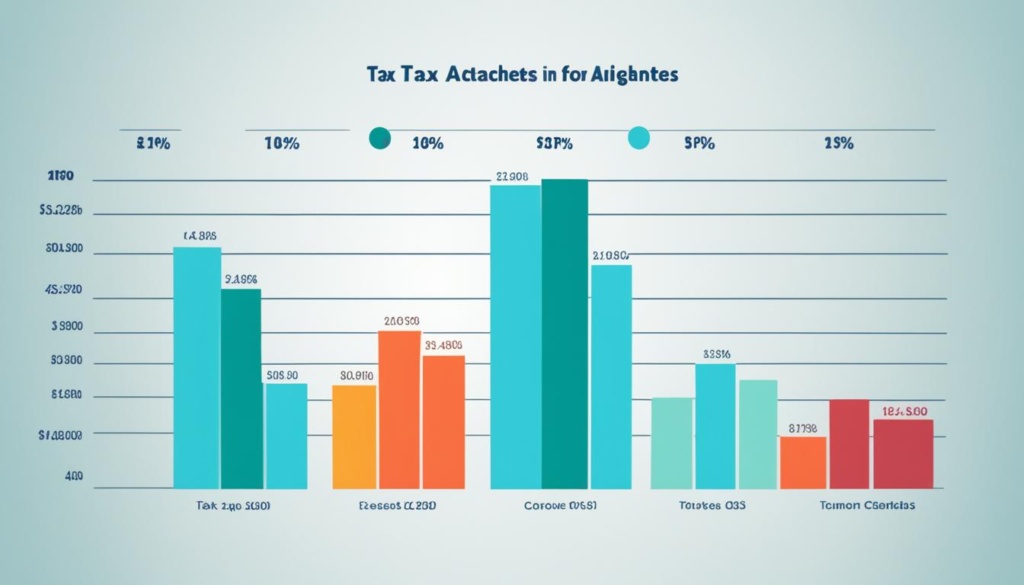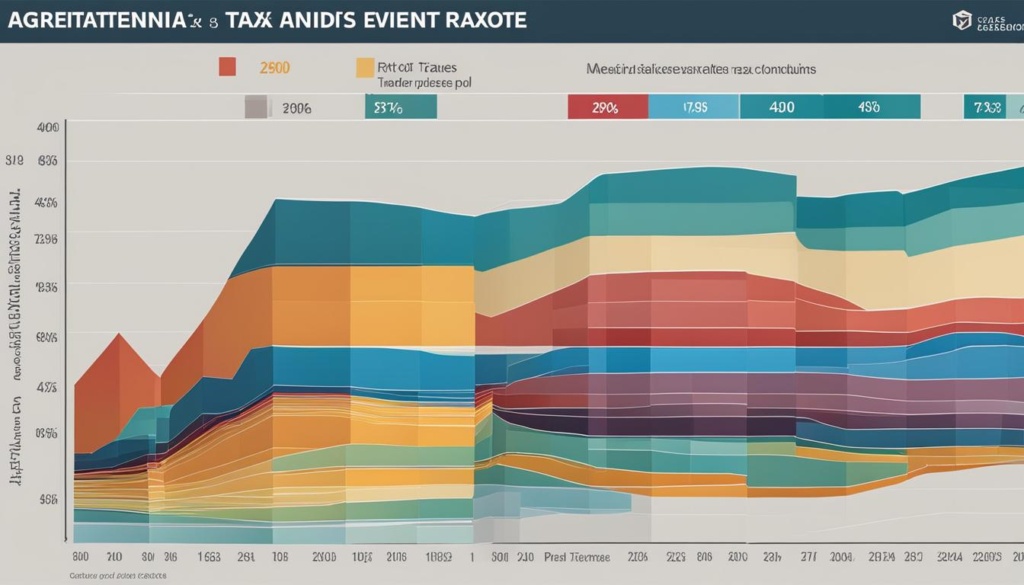Welcome to our comprehensive guide to understanding tax rates in Argentina. Whether you are a resident or a non-resident, it’s vital to have a clear understanding of the tax structure and obligations in this popular expat destination. In this article, we will explore the tax brackets, highlight recent tax reforms, and provide key insights into the tax system in Argentina.
Argentina is known for its diverse and vibrant culture, attracting expats from all over the world. Currently, more than 60,000 US expats call Argentina home. To ensure smooth financial management, it’s important to be aware of the tax rates in Argentina, which can impact your income and financial planning.
From income tax rates to corporate tax obligations, we will dive into the different aspects of the tax system in Argentina. We will also discuss tax incentives and reforms aimed at attracting investment and stimulating economic growth in the country.
For US expats living in Argentina, understanding tax obligations can be particularly complex. We will provide insights into the tax compliance requirements and tax treaty agreements that can help minimize double taxation.
Stay tuned as we explore various tax considerations, filing requirements, and ways to stay compliant with Argentina tax laws. Our goal is to equip you with the knowledge and insights needed to navigate the tax system in Argentina effectively.
Argentina Income Tax Rates Explained
The income tax system in Argentina is progressive, meaning that the more you earn, the higher the percentage of your income that you will be required to pay in taxes. Currently, the income tax rates in Argentina range from 5% to 35%, depending on the amount of income earned. There are different tax brackets that determine the applicable rate.
For example, individuals with an income of up to ARS 173,834.61 are taxed at a rate of 5%, while those with an income over ARS 2,781,353.86 are taxed at a rate of 35%.
It’s important to note that residents are taxed on all the income they make, while non-residents are only taxed on the income they make in Argentina.
Income tax rates in Argentina follow a progressive structure, with higher income earners paying a higher percentage of their income in taxes.
Argentina Corporate Tax Rates Explained
When it comes to corporate tax rates in Argentina, businesses are subject to a flat rate of 30%. This means that regardless of the level of income, all companies are required to pay taxes at this fixed rate. However, it’s important to note that certain deductions and exemptions may apply, which can lower the effective tax rate for eligible businesses.
In addition to income tax, companies operating in Argentina are also responsible for paying other taxes, such as the Value-Added Tax (VAT) and social security contributions. The VAT is a consumption tax that is levied on the sale of goods and services, and the standard rate is generally 21%. It’s crucial for businesses to factor in these additional tax obligations when planning their finances and budgeting.
To provide a clearer overview, here is a breakdown of the key points regarding corporate tax rates in Argentina:
Argentina Corporate Tax Rates:
- Flat Rate: 30%
- Possible deductions and exemptions
- Additional taxes: VAT, social security contributions
Understanding the intricacies of the tax structure in Argentina is essential for businesses to fulfill their tax obligations and optimize their tax strategy. By taking advantage of available deductions and exemptions, companies can potentially reduce their tax liability and improve their overall financial position.
By staying well-informed about the corporate tax rates and tax structure in Argentina, businesses can navigate the tax landscape with confidence and ensure compliance with applicable regulations.
Other Taxes in Argentina
In addition to income tax, there are other taxes that may apply in Argentina. These taxes play a significant role in the overall tax structure in Argentina and have implications for individuals and businesses operating in the country.
One of the key taxes in Argentina is the value-added tax (VAT). This tax is imposed on the sale of goods and services and is an important source of revenue for the government. The VAT rate in Argentina is generally 21%, which is applied to the value-added at each stage of production and distribution.
The VAT rate can vary for certain items and services. For example, utility services such as electricity and gas may have a higher VAT rate. It’s important for businesses and consumers to be aware of the applicable VAT rate for different goods and services to ensure proper compliance and budgeting.
Argentina also imposes a personal assets tax, which is based on the net value of an individual’s assets. This tax applies to both residents and non-residents who own assets in Argentina. The tax rate for personal assets can range from 0.5% to 1.25%, depending on the total value of the assets.
Additionally, Argentina has a stamp tax, which is levied on public or private instruments executed in Argentina. This includes documents such as contracts, deeds, and financial instruments. The stamp tax rate can vary depending on the type of instrument and the value involved.
Tax Comparison – VAT Rates in Selected Countries
| Country | VAT Rate |
|---|---|
| Argentina | 21% |
| United States | No national VAT |
| Germany | 19% |
| United Kingdom | 20% |
Understanding these other taxes in Argentina is crucial for individuals and businesses to ensure full compliance and proper financial planning. It’s important to consult with tax professionals or advisors to navigate the complexities of the tax system and make informed decisions.

Tax Incentives and Reforms in Argentina
Argentina has implemented various tax incentives and reforms to attract investment and stimulate economic growth. These measures aim to provide benefits for specific industries, regions, and activities, as well as to simplify the tax system and reduce the tax burden on individuals and businesses.
One of the key tax incentives in Argentina is the granting of tax exemptions for certain industries or regions. By exempting eligible businesses from paying taxes, the government encourages investment and economic development in targeted areas or sectors.
Furthermore, Argentina offers special tax rates for specific activities, attracting investors and promoting growth in areas deemed strategic or essential for the country’s development. These preferential tax rates can significantly reduce the overall tax liability for businesses operating in those sectors.
The Argentine government also provides tax credits for research and development (R&D) activities. By incentivizing companies to invest in R&D, the government aims to promote innovation and technological advancement, fostering long-term economic growth and competitiveness.
Additionally, the government has introduced tax reforms aimed at simplifying the tax system and reducing the administrative burden on individuals and businesses. These reforms seek to streamline tax processes, enhance compliance, and ensure a fairer distribution of the tax burden.
Staying up to date with these tax incentives and reforms is crucial for individuals and companies operating in Argentina. By understanding and taking advantage of these opportunities, individuals and businesses can optimize their tax position, reduce costs, and enhance their competitiveness in the market.
Benefits of Tax Incentives and Reforms in Argentina
The implementation of tax incentives and reforms in Argentina brings several benefits to the economy and its stakeholders:
- Promotes investment: Tax incentives attract domestic and foreign investment, stimulating economic growth and creating job opportunities.
- Encourages innovation: Tax credits for R&D activities incentivize companies to invest in research and development, fostering innovation and technological advancement.
- Reduces tax burden: Special tax rates and exemptions lessen the tax burden on businesses, increasing their profitability and competitiveness.
- Supports targeted industries and regions: By providing tax incentives for specific industries or regions, the government stimulates growth in strategic sectors and areas of the country.
- Simplifies the tax system: Tax reforms aim to simplify tax processes, reducing administrative burdens for individuals and businesses.
Overall, tax incentives and reforms in Argentina play a crucial role in promoting economic development, attracting investment, and enhancing competitiveness. By leveraging these opportunities, individuals and businesses can contribute to the country’s growth while optimizing their tax position.
| Benefits of Tax Incentives and Reforms in Argentina |
|---|
| Promotes investment |
| Encourages innovation |
| Reduces tax burden |
| Supports targeted industries and regions |
| Simplifies the tax system |
Argentine tax incentives and reforms provide a range of benefits for individuals and businesses in terms of investment promotion, innovation support, reduced tax burden, targeted industry and regional support, and simplified tax processes.
Tax Obligations for US Expats in Argentina
US expats living in Argentina have unique tax obligations that require compliance with both US and Argentina tax laws. It is essential for US expats to understand their filing requirements and seek professional tax guidance to navigate the complexities of international taxation.
As US expats, individuals are required to file tax returns in both the United States and Argentina. This means reporting worldwide income and ensuring compliance with the tax regulations of both countries.
Fortunately, there are tax treaties and totalization agreements in place between the US and Argentina that can help avoid double taxation and provide relief for US expats. These agreements ensure that individuals are not taxed twice on the same income and enable them to benefit from the tax provisions outlined in the treaties.
It’s crucial for US expats to consult with tax professionals who specialize in international taxation to understand their specific tax obligations and take advantage of any available tax benefits or exemptions. These professionals can provide guidance on tax filing strategies, help minimize tax liability, and ensure compliance with both US and Argentina tax laws.
“US expats living in Argentina have complex tax obligations that require expert guidance to ensure compliance with both US and Argentina tax laws.”
To summarize, US expats in Argentina must be diligent in meeting their tax obligations. They need to file tax returns in both countries, report worldwide income, and seek professional tax guidance to navigate the complexities of international taxation. By staying informed and compliant, US expats can ensure a smooth and efficient tax filing process.
Tax Obligations for US Expats in Argentina
| Key Tax Obligations | Description |
|---|---|
| Filing Tax Returns | US expats must file tax returns in both the US and Argentina. |
| Reporting Worldwide Income | US expats are required to report their worldwide income to both tax authorities. |
| Tax Treaties and Totalization Agreements | Tax treaties and totalization agreements between the US and Argentina help avoid double taxation and provide tax relief for US expats. |
| Professional Tax Guidance | US expats should consult with tax professionals specializing in international taxation to understand their specific tax obligations and optimize their tax situation. |
Determining Tax Residency in Argentina
Determining tax residency in Argentina is crucial as it directly impacts an individual’s tax obligations. Residency status determines the tax rules and rates that apply to individuals. There are several factors that determine tax residency in Argentina:
- Permanent Residency: Individuals who have obtained permanent residency in Argentina are considered residents for tax purposes. Permanent residency is usually granted to individuals who have lived in the country for a specific period of time or have met certain criteria set by the immigration authorities.
- Duration of Stay: Individuals who have resided in Argentina for more than twelve months, regardless of their nationality, are considered residents for tax purposes. This applies even if they do not hold permanent residency status.
- Tax Residency in Another Country: Argentinian nationals who are tax residents of another country are still considered residents for tax purposes in Argentina. This means they need to comply with tax obligations in both countries.
On the other hand, non-residents are subject to different tax rules and rates in Argentina. Non-residents are only taxed on the income they generate within Argentina’s borders.
Understanding one’s tax residency status is crucial for proper tax compliance. It helps individuals determine the extent of their tax obligations and allows them to take advantage of any applicable tax benefits or incentives. It’s recommended to consult with a tax professional or seek advice from the tax authorities to ensure accurate determination of tax residency.
Tax Filing Requirements in Argentina
Understanding the tax filing requirements in Argentina is essential to ensure compliance with the country’s tax laws. Whether you are a resident or a non-resident, timely filing of your tax returns is important to avoid penalties and other consequences. Here’s what you need to know about tax filing requirements in Argentina:
Tax Year and Deadlines
The tax year in Argentina runs from January 1st to December 31st. Tax returns for the previous year are typically due on June 30th of the following year. However, US expats living in Argentina are granted an automatic two-month extension, allowing them to file their tax returns by June 15th. It’s important to mark these dates on your calendar and ensure that you meet the filing deadlines to avoid any issues.
Resident and Non-Resident Filing Requirements
The tax filing requirements in Argentina vary depending on your residency status. Residents are required to report and pay taxes on their worldwide income. This includes income earned in Argentina as well as income earned abroad.
Non-residents, on the other hand, are only required to report and pay taxes on income earned within Argentina. It’s important to determine your residency status to know the extent of your filing obligations.
Reporting and Documentation
When filing your tax returns in Argentina, you will need to provide accurate and complete information about your income, deductions, and any applicable tax credits. It’s essential to keep detailed records and supporting documentation to substantiate your claims and ensure compliance with the tax laws.
Penalties for Non-Compliance
Failure to comply with tax filing requirements in Argentina can result in penalties, fines, and even legal consequences. It’s crucial to take your tax obligations seriously and fulfill them in a timely and accurate manner. If you have any doubts or uncertainties, it’s advisable to seek professional tax guidance to ensure compliance and avoid any potential issues.
Being aware of the tax filing requirements in Argentina and staying up to date with your tax obligations will help you navigate the tax system with ease and peace of mind.
**Note:** Image for illustrative purposes only, not an actual representation of tax filing requirements in Argentina.
Tax Withholding and Payment in Argentina
In Argentina, tax withholding plays a significant role, particularly when it comes to employment income. Employers have the responsibility of deducting income tax from employee salaries and remitting it to the tax authorities. This ensures that taxes are consistently paid throughout the year and eliminates the burden of a lump sum tax payment for individuals during the tax filing period.
Not only is tax withholding common for employees, but self-employed individuals and non-residents may also be subject to withholding. These measures are in place to maintain tax compliance and ensure the proper functioning of the tax system in Argentina.
To comply with tax withholding requirements, individuals need to be aware of the applicable rates. The tax rates in Argentina vary depending on the individual’s income level and tax residency status. Higher income earners may face a higher tax rate, while lower income earners may have a lower rate. Therefore, it’s essential to understand the specific withholding rates that apply to your income bracket.
By accurately calculating and withholding the correct amount of income tax, individuals can avoid penalties and issues with tax compliance. Additionally, maintaining proper tax payment throughout the year can help individuals manage their tax liabilities more efficiently and avoid financial burdens during the tax filing season.
For a visual representation of the tax withholding process in Argentina, refer to the table below:
| Income Level | Tax Withholding Rate |
|---|---|
| Up to ARS 173,834.61 | 5% |
| ARS 173,834.62 – ARS 471,150.34 | 9% |
| ARS 471,150.35 – ARS 797,695.54 | 14% |
| ARS 797,695.55 – ARS 1,198,543.09 | 19% |
| ARS 1,198,543.10 – ARS 1,737,648.94 | 23% |
| ARS 1,737,648.95 – ARS 2,781,353.85 | 27% |
| Over ARS 2,781,353.85 | 31% |
Understanding tax withholding is vital for individuals who receive income in Argentina. It ensures that taxes are collected in a timely manner and facilitates a more efficient tax payment process. By staying informed about the applicable rates and fulfilling tax payment obligations, individuals can maintain compliance and avoid any potential penalties or issues with the tax authorities.
Other Taxes and Contributions in Argentina
In addition to income tax, individuals and businesses in Argentina are also subject to other taxes and contributions. These taxes play a significant role in the overall tax structure of the country and contribute to various social and economic programs.
Payroll Taxes
One of the key taxes that individuals and employers must be aware of in Argentina is payroll taxes. These taxes are contributions made to social security and social health care programs. The rates for payroll taxes can vary based on the type of employment and the income level of the individual.
Payroll taxes in Argentina are calculated based on a percentage of the employee’s salary. The rates for social security contributions range from 17% to 23%, while social health care contributions range from 6% to 8%. Employers are responsible for withholding these contributions from employee salaries and remitting them to the appropriate tax authorities.
Indirect Taxes
Another important category of taxes in Argentina is indirect taxes, with the most significant being the value-added tax (VAT). The VAT is a consumption tax charged on the sale of goods and services at each stage of production and distribution.
The standard VAT rate in Argentina is 21%, but certain goods and services may be subject to higher rates. For example, utility services like gas, electricity, and water can have a VAT rate of 27%. It’s crucial for businesses and individuals to understand the VAT regulations and factor them into their financial planning and transactions.
Understanding the intricacies of payroll taxes and indirect taxes is essential for individuals and businesses operating in Argentina. Complying with the relevant tax laws and fulfilling payment obligations ensures a smooth and legal operation, avoiding potential penalties and other consequences.

Tax Considerations for Expatriates in Argentina
Expatriates living and working in Argentina may have specific tax considerations to keep in mind. It’s crucial for expatriates to understand the tax implications of their international status and take appropriate steps to ensure compliance. Here are some key tax considerations for expatriates in Argentina:
Tax Residency and Filing Requirements
One of the first considerations for expatriates is determining their tax residency status in Argentina. Tax residency is typically determined by factors such as the duration of stay, permanent residency status, and ties to the country. Expatriates who meet the criteria for tax residency in Argentina are generally subject to income tax on their worldwide income.
Expatriates who are considered tax residents in Argentina must file an annual tax return, reporting their global income. It’s important to note that expatriates may also have obligations to file tax returns in their home country, depending on their home country’s tax laws.
Tax Treaties and Double Taxation
Expatriates can benefit from tax treaties between Argentina and their home country. These treaties are designed to prevent double taxation by allocating taxing rights and providing relief from double taxation through mechanisms such as tax credits or exemptions.
It is essential for expatriates to understand the provisions of the tax treaty between Argentina and their home country and take advantage of any available benefits to avoid being taxed twice on the same income.
Tax Benefits and Exemptions
Expatriates may be eligible for certain tax benefits or exemptions in Argentina. These can include deductions for specific expenses related to their work or relocation, exemptions for certain types of income, or reduced tax rates for specific activities or industries.
Expatriates should explore these tax benefits and exemptions to optimize their tax situation and minimize their tax liability. Consulting with a tax professional who specializes in expatriate tax planning can help identify all available opportunities.
Tax Planning and Professional Advice
Engaging in tax planning is crucial for expatriates in Argentina. With the complexities of international taxation and potential tax implications in multiple jurisdictions, seeking professional advice from a qualified tax advisor is highly recommended.
A tax advisor with expertise in expatriate tax planning can help expatriates understand their specific tax obligations, navigate the complexities of the tax system, and develop strategies to minimize their overall tax burden.
Staying Compliant with Argentina Tax Laws
Complying with the tax laws in Argentina is essential for individuals and businesses to avoid penalties and legal issues. It is crucial to adhere to the regulations by ensuring timely filing of tax returns, accurate reporting of income and deductions, and making proper tax payments.
One key aspect of staying compliant is to stay up to date with any regulatory changes in Argentina’s tax laws. Tax laws and requirements can change over time, and it is important to be aware of any updates that may affect your tax obligations. Being informed about changes in tax rates, the introduction of new tax incentives, or modifications in filing deadlines can help you meet your obligations accurately.
To ensure full compliance and optimize your tax situation, seeking professional tax guidance is highly recommended. Tax experts can provide valuable insights and advice tailored to your specific circumstances. They can assist you in navigating the complexities of Argentina’s tax system, help you identify eligible deductions and exemptions, and ensure that you meet all tax obligations efficiently.
By staying compliant with Argentina tax laws, individuals and businesses can maintain a good standing with the tax authorities, avoid unnecessary penalties and fines, and contribute to the stability and growth of the country’s economy.
More from our blog
See all postsRecent Posts
- Argentina Property Management: Expert Care & Services February 2, 2024
- Understanding Argentina Real Estate Law Essentials February 2, 2024
- Argentina Luxury Apartments: Upscale Living February 1, 2024










